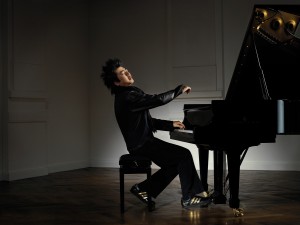
Two Younger Titans of the Piano
Pianist Yuja Wang.
Few things are as much fun, or as contentious, as arguing about which singer, which conductor, or which performer on a certain instrument, is the best.
As a fellow who started playing the piano when I was a little boy, I’ve always enjoyed talking about great pianists of the past and the present. I remember, for instance, seeing Vladimir Horowitz in the mid-1970s in Chicago and being impressed not only by the music but by the reverence in which the audience held him. I always try to find time to attend as many piano recitals as I can during a given season, and I always come away with a lot to think about.
This season, two young Chinese-born pianists with major careers achieved or in the making will be on South Florida concert stages.
Lang Lang, who is probably the most widely known younger player in the world today, will make two stops in the area with the Schleswig-Holstein Festival Orchestra under Christoph Eschenbach. On March 29, he’ll play the Prokofiev Third Concerto the Knight Concert Hall, and two days later, will play the Mozart Concerto No. 17 (in G, K. 453) with the orchestra at the Kravis Center in West Palm Beach. The next afternoon, he’ll play the Prokofiev, also at the Kravis.

Pianist Lang Lang, in flight.
At his best, Lang is a pianist with formidable technical chops and control, the kind of control that allows you to do frightening things with dynamics, going from whisper to cataract in the blink of an eye. He also possesses a degree of showmanship that remains unusual for such a communicative art; he clearly loves what he’s doing, and while many observers deride his exuberance and call him unkind things such as “Bang Bang,” this is the kind of show-biz power that reaches beyond the cognoscenti to a much larger audience, and that can’t be dismissed out of hand.
Personally, I find him too wayward in his interpretations to be completely persuasive. Taking two YouTube performances for examples, he does lovely things with the Nocturne in D-flat, Op. 27, No. 2 of Chopin, stretching it decidedly, but giving it the kind of misty, late-night languor that its title suggests. On the other hand, he takes too many liberties with the same composer’s E major Etude (Op. 10, No. 3), never allowing the melody to proceed in a straightforward way. But it’s the kind of performance that wins raves because the tune is so famous that lingering over it can be forgiven.
Lang is 27, still quite young, and an even younger Chinese-born pianist, 22-year-old Yuja Wang, also will be playing several concerts here. On March 3-4, she’s at the Kravis for two concerts with the Russian National Orchestra under Patrick Summers; she’ll play the Rachmaninov Second Concerto (in C minor, Op. 18) and the Beethoven Fifth Concerto (in E-flat, op. 73, Emperor). From April 16-18, she appears at the New World Symphony in three performances of the Bartok Second Concerto.
Wang has just released her first disc on the Deutsche Grammophon label, a record that contains two Romantic standards — the Chopin Second Sonata (in B-flat minor, Op. 35) and the Liszt Sonata in B minor — and three much rarer pieces: two etudes by the late Hungarian master Gyorgy Ligeti (No. 4, Fanfares, and No. 10, The Sorcerer’s Apprentice), and an early sonata (No. 2 in G-sharp minor, Op. 19) of the Russian Alexander Scriabin.
If Lang is like Horowitz in his bravura and his interpretive freedom-taking, Wang is much more like Artur Rubinstein in her clarity, sobriety, and good taste. In Wang’s hands, neither the Chopin nor the Liszt sonata is tempestuous in the sense that it leaves the listener sweating and gasping. But Wang gives both pieces an architectural monumentality that says that the music is at once enjoyable to listen to and also important.
From my first acquaintance with her work on a recital broadcast from the Verbier Festival last summer on medici.tv, I’ve been struck by the relative maturity of her interpretations and her willingness to play a wide range of repertoire. Her technique is close to flawless, and she lets the music itself command attention, rather than her playing of it.
I prefer Yuja Wang’s pianism to that of Lang Lang, and I think she is likely to be one of the most prominent pianists in the world in very short order. She can play anything, and play it with the kind of musical integrity that suggests she will be not just a great pianist, not just an exciting pianist, but an important one. And I for one will be eager to watch her make that mark.